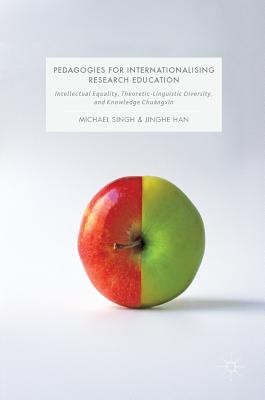
- We will send in 10–14 business days.
- Author: Michael Singh
- Publisher: Palgrave Macmillan
- ISBN-10: 9811020647
- ISBN-13: 9789811020643
- Format: 15.5 x 22 x 2.1 cm, kieti viršeliai
- Language: English
- SAVE -10% with code: EXTRA
Pedagogies for Internationalising Research Education (e-book) (used book) | bookbook.eu
Reviews
Description
This book explores pedagogical concepts, metaphors and images of non-white, non-western researchers and research students on the inter/nationalization of education. Specifically, this book draws on the intellectual resources of China and India to explore the pedagogical dynamics and dimensions of the localization/globalization of education with non-Western characteristics. It introduces theoretic-linguistic non-Western concepts from the Tamil, Sanskrit and Chinese languages for use in Western, English-only education and redefines the intellectual basis for internationalising education.
Debating whether 'international education' is Western-centric in terms of its privileging and promotion of Euro-American theoretical knowledge, this book contends that the internationalisation of Western-centric education can benefit from the intellectual power and powerfully relevant theorising performed by non-Western international students. It formulates a democratic vision for the internationalisation of education, with the potential to create transnational solidarity and constitute a forum for mobilising debates about global knowledge and power structures. It also provides key tools to use non-Western theoretic-linguistic tools and modes of critique in research undertaken in Anglophone Western universities.
EXTRA 10 % discount with code: EXTRA
The promotion ends in 21d.16:57:56
The discount code is valid when purchasing from 10 €. Discounts do not stack.
- Author: Michael Singh
- Publisher: Palgrave Macmillan
- ISBN-10: 9811020647
- ISBN-13: 9789811020643
- Format: 15.5 x 22 x 2.1 cm, kieti viršeliai
- Language: English English
This book explores pedagogical concepts, metaphors and images of non-white, non-western researchers and research students on the inter/nationalization of education. Specifically, this book draws on the intellectual resources of China and India to explore the pedagogical dynamics and dimensions of the localization/globalization of education with non-Western characteristics. It introduces theoretic-linguistic non-Western concepts from the Tamil, Sanskrit and Chinese languages for use in Western, English-only education and redefines the intellectual basis for internationalising education.
Debating whether 'international education' is Western-centric in terms of its privileging and promotion of Euro-American theoretical knowledge, this book contends that the internationalisation of Western-centric education can benefit from the intellectual power and powerfully relevant theorising performed by non-Western international students. It formulates a democratic vision for the internationalisation of education, with the potential to create transnational solidarity and constitute a forum for mobilising debates about global knowledge and power structures. It also provides key tools to use non-Western theoretic-linguistic tools and modes of critique in research undertaken in Anglophone Western universities.


Reviews